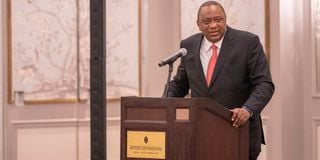Kenya joins US and UK in defying international court’s decisions

President Uhuru Kenyatta gives his remarks when he witnessed the signing of a Kenya-US private sector trade agreement in New York, USA on October 12, 2021.
By rejecting the International Court of Justice (ICJ)’s ruling over a maritime dispute with Somalia, Kenya joins the United States, the United Kingdom and other states that have defied the United Nations body.
The UK voted against General Assembly resolution 73/295 that was based on the ICJ ruling of its maritime dispute with Mauritius, claiming the two were not the appropriate forums for resolving “what is fundamentally a bilateral matter” of disputed sovereignty between two states.
In the 2019 ruling, ICJ said the decolonisation of Mauritius was not lawfully completed with the separation of the Chagos Archipelago and called on the UK to end its administration of the islands. Despite the ruling, London maintains it has sovereignty over the archipelago and will only cede it when it is no longer needed for defence purposes.
The archipelago was separated from Mauritius in 1965, when it was still a British colony. Media reports say Britain purchased it for £3 million, creating the British Indian Ocean Territory (BIOT). The UK then leased the land to the US, which runs a large military base on the main island of Diego Garcia.
The UK said the defence facility on BIOT plays a vital role against terrorist threats and piracy. The site hosts one of the world’s four GPS stations that are widely used for military and civilian navigation.
“Any action that potentially compromises the current or future operations of the joint United Kingdom and United States defence facility on BIOT should therefore be of concern to all States, given the important role the facility plays in maintaining regional and global peace and security — a role that Mauritius itself acknowledges,” the UK stated.
London said Mauritius representatives freely agreed to the detachment of the islands in return for a wide range of benefits, including fishing rights, marine resources, £3 million compensation paid to the government and direct compensation to landowners and others affected in addition to undertaking to cede BIOT when it is no longer needed for defence purposes.
London accused ICJ of considering a bilateral dispute without the consent of both concerned . It added that the court was setting new precedent that would have wider implications for other states.
In 2018, Iran filed a lawsuit against the US at ICJ, alleging that President Donald Trump’s decision to impose sanctions after pulling out of a nuclear deal violated a 1955 treaty between the two countries.
In its reaction, the Trump administration defied a decision by ICJ to hear the case and withdrew from the optional protocol and dispute resolution to the Vienna convention on diplomatic relations between estates.
In 1984, the US defied an order by ICJ requiring it to end its military or paramilitary activities in or against Nicaragua on grounds that it had violated the obligations imposed by customary international law not to intervene in the affairs of another state.
The court had already made interim orders asking the US to immediately cease and refrain from any action restricting access to Nicaraguan ports and, in particular, the laying of mines. It also called on US to respect Nicaraguans’ right to sovereignty and political independence.
However, the US withdrew from the case after filing its submissions. Before the case could close, Nicaragua informed the court of its wish to discontinue with the proceedings, a decision that was welcomed by the US.
The ICJ is the UN’s highest court for resolving disputes between nations, but it has no power to enforce them. This has led to some disputing countries ignoring cases they have brought against each other in the past.





